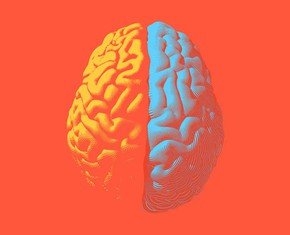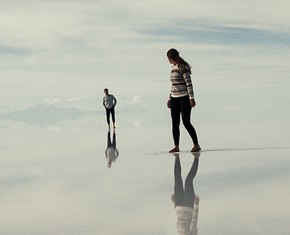The views expressed in our content reflect individual perspectives and do not represent the authoritative views of the Baha'i Faith.
The Baha’i teachings caution us against fabricating false imaginations of our Creator — and also warn us about visualizing false imaginations of death.
In the Baha’i view, a spiritual existence awaits all people after this life. There is no hell and no actual death — we all undergo a “second birth,” as Abdu’l-Baha described it in a speech he gave in Montreal in 1912:
… for the perfect man there are two kinds of birth: the first, physical birth, is from the matrix of the mother; the second, or spiritual birth, is from the world of nature. In both he is without knowledge of the new world of existence he is entering. Therefore, rebirth means his release from the captivity of nature, freedom from attachment to this mortal and material life.
One of the biggest miseries in this world is the fear of death, but in truth, the Baha’i teachings say, this fear is unwarranted, for it is the fear of an illusory idea.
RELATED: Can We Die Joyously?
In the Baha’i teachings, the word imagination is also often used to connote the worldly attachments and false ideas we have in life. Throughout his writings, Baha’u’llah exhorted people to free themselves from these “vain imaginations.” In order to get closer to the truth, he counseled humanity, we must purify and detach ourselves from our false ideas and feelings. These vain imaginations include vanity, materialism, disbelief in God, and fear of death, to name just a few.
Since imagination can debar us from the truth, we must transcend the captivity of our imagination. In order to find the truth, Abdu’l-Baha wrote: “Man must cut himself free from all prejudice and from the result of his own imagination, so that he may be able to search for truth unhindered.” He also said that searching for the truth requires reason, for: “… reason is the discoverer of the realities of things, and that which conflicts with its conclusions is the product of human fancy and imagination.”
Part of banishing vain imaginations from our lives involves the application of facts and reason. Baha’is believe that religion should be rational and in harmony with science: “If statements and teachings of religion are found to be unreasonable and contrary to science, they are outcomes of superstition and imagination.”
But as rational beings, we are also intuitive beings. We need reason in the search for truth, but we can also use our intuitive faculties and inspiration, which can be a guiding power in the search for truth.
However, according to Abdu’l-Baha, there is a difference between truth-seeking inspiration and ignorant imagination: “… inspiration is in conformity with the Divine Texts, but imaginations do not conform therewith.” We can use our intuition, but it must be guided by not only our reason but also by the teachings of the divine messengers, who bring truth to humanity.
RELATED: Are You Ready to Meet Your Maker?
We need faith but not blind faith.
Our faith must be combined with reason: our acceptance of truth must be preceded by independent investigation.
Without a doubt, imagination forms an essential faculty of the human mind. In the Baha’i Faith, the arts and sciences are highly praised and valued. Without imagination, they would not exist. Without the imagination, we could not be inventive and change and develop the world.
Some of the greatest minds that ever existed were highly imaginative people. Their ideas sprang from imagination and were then brought into fruition through reason and experimentation. Therefore, imagination must be combined with reason and practicality for it to guide us to reality.
More than this, imagination and reason must be grounded in virtue, otherwise man-made creations can become corrupt and destructive. For confirmation of that fact, witness the proliferation of terrible weapons of war.
In religion and spirituality, imagination can bring about many transcendent visions and perceptions in people, but if these are not assessed with reason, a person may become deluded and led astray from the truth. If their intuitive powers are not guided by virtue, though their experience may feel spiritual, they may, in fact, be consumed in their own ego, experiencing a kind of false enlightenment.
To guard against these delusions and vain imaginations, the Baha’i teachings offer clear guidelines, including this one from Baha’u’llah: “Rend thou asunder the veils of idle fancies and vain imaginings, that thou mayest behold the Daystar of knowledge shining from this resplendent Horizon.”
These profound writings can help us all banish the fear of death from our lives. As Abdu’l-Baha put it, “Through his ignorance, man fears death; but the death he shrinks from is imaginary and absolutely unreal; it is only human imagination.” In truth, death is only the transition from a lower plane of existence to a higher plane and therefore is not something to be feared. In fact, Baha’u’llah wrote that God has “… made death a messenger of joy …”
















Comments
Sign in or create an account
Continue with Googleor